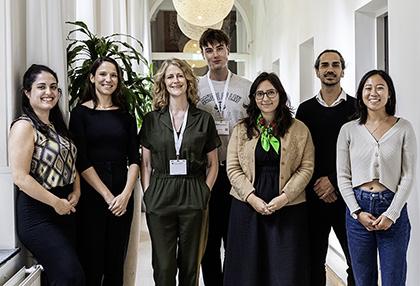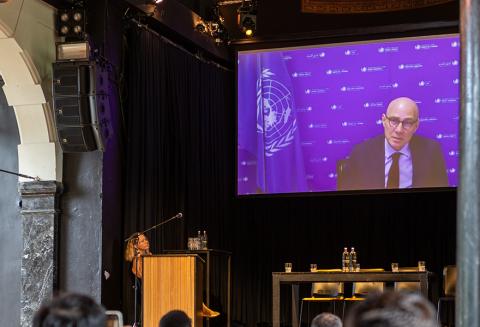The Promise Europe launches with Amsterdam summit on human rights and environmental harm

Dozens of the world’s top thought leaders and advocates in international law, human rights, racial justice and ecological crises convened in Amsterdam, the Netherlands, from May 27 to 29, for a conference marking the launch of UCLA School of Law’s the Promise Institute Europe.
The dynamic and forward-looking institute opened in the Hague in late 2023 as a hub of the study, teaching and advocacy of international human rights policy and law at a time when the world needs it most. It is UCLA’s second international affiliate after UCLA Congo Basin. Kate Mackintosh, a prominent authority in global human rights, serves as the Promise Europe’s inaugural executive director. She had previously steered the Promise Institute for Human Rights at UCLA Law during its launch and rapid growth as a home of leadership in global justice.
She oversaw the proceedings during the conference, which UCLA Law co-hosted with the University of Amsterdam’s law school. Anne-Sophie Vivier, representing the small island nation of Vanuatu, served as emcee.
The three days of discussion centered on how environmental degradation and climate change impact global human rights and can be addressed through international law. Mackintosh and her colleagues are authorities in the expanding doctrine of ecocide, which has been a focus of work in the Promise Institute that continues with Mackintosh’s move to the Promise Europe.
“This is a pivotal year for international law, human rights and the environment, as three major international courts have been asked for legal opinions on states’ responsibilities in the face of climate change,” Mackintosh says. “The conference brought together many of the key actors in these proceedings, as well as those working to criminalize ecocide and dealing with environmental war crimes in places like Ukraine and Sudan, with the hope of learning from each other and influencing the submissions and outcomes of those proceedings.”
Several members of the UCLA Law faculty participated in the conference, including Michael Waterstone, dean of the law school; Máximo Langer, faculty director of the Promise Europe and the Promise Institute; and Hannah Garry, executive director of the Promise Institute. Six current or recently graduated UCLA Law students also attended.
They participated in events featuring speakers, scholars and practitioners from a wide range of sectors around the world. These included diplomats from Bangladesh, the Bahamas and the Organization of African, Caribbean and Pacific Group of States; lawyers who practice before international courts; youth climate activists from the Solomon Islands, Uganda, the Netherlands and the Philippines; and many distinguished academics, including members of the International Law Commission and the president of the University of Fiji.
“The conversations I had with other activists and scholars about ecocide and indigenous sovereignty were incredibly thought-provoking and inspiring. These connections are ones that I will continue to cherish and will undoubtedly have a lasting impact on my legal career.”

Conference panels included “Conflict, Environmental Harm and International Criminal Law,” “Climate Change, Justice and the Future of the Law of the Sea,” “Environmental Rights and Climate Justice,” and “Evidence, State Responsibility and the Voices of the Most Vulnerable.”
“The conversations I had with other activists and scholars about ecocide and indigenous sovereignty were incredibly thought-provoking and inspiring,” says UCLA Law student Julia Nguyen ’25. “These connections are ones that I will continue to cherish and will undoubtedly have a lasting impact on my legal career.”
In his keynote address, Volker Türk, the United Nations High Commissioner for Human Rights, expressed support for classifying ecocide as a new international crime. In another keynote presentation, Nazhat Shameem Khan, a deputy prosecutor at the International Criminal Court, said, “We know that unchecked environmental degradation poses an existential threat to the world as we know it. The international legal system, including the ICC, stands at a crucial juncture where we must remain relevant and respond to this crisis before it is too late.”
Cheryl Bazard, the ambassador of the Bahamas to Belgium and the European Union, also addressed the topic in a stirring speech. “Devastating storms, rising sea-levels, unpredictable weather patterns and other adverse effects of climate change threaten the very existence of our islands and the livelihoods and identities of our people,” she said. “The obligations of states in respect of climate change are not an abstract legal exercise, but a matter of survival.”
In addition, the Promise Europe hosted a high-level consultation for the ICC prosecutor, Karim Khan, regarding his forthcoming policy paper on environmental crimes. This allowed him and Kevin Jon Heller, a scholar of international law and special advisor to the ICC, to hear from a broad array of viewpoints, including from environmental activists and attorneys on the frontlines of the climate emergency. The conversation stemmed from a project in which Mackintosh had supervised a group of UCLA Law students who analyzed responses to a public call for inputs on this policy.
The Promise Europe came away from the conference rich with projects that participants formulated or made stronger through their collaboration at the event. These include work with, and legal assistance for, youth climate activists across Africa; a collaboration with academic partners on a new evidence resource for climate litigation; and continued support to the ICC prosecutor on environmental crimes.
“At the conference, we worked with practitioners and activists to ask what story we need to tell, whose story we need to tell and how we need to tell it to make the most compelling case for climate and environmental justice,” Mackintosh says. “Crucially, we are foregrounding the voices and analyses of people on the frontlines of the ecological crisis, as without these inputs we will never find comprehensive and lasting solutions. It is time to unlock the potential of international law to confront this crisis and move us towards a new era of multi-species care, kinship and justice.”